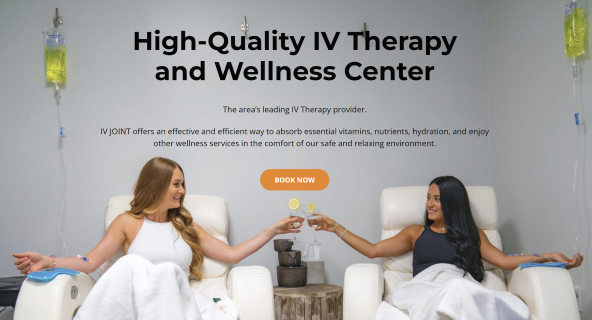Issue #321: What's the Deal with IV Drip Bars?
Good morning. It’s Tuesday, March 26th.
Stat of the Day
The size of the IV hydration therapy market - which is growing at 8.7% per year. (source)
Learn
IV Drip Bars
You can’t find one of the fastest growing “supplements” at the grocery store.
IV Therapy is one of the latest wellness crazes taking over the U.S. - yes, just about everywhere. Even here in Tampa (which isn’t exactly the leading city on wellness) - there are 11 IV “drip bars” within 5 miles of my house.
And for about $250K you too can own a location for one of these emerging franchises - The DRIPBaR, The Hydration Room, Liquivida Lounge, etc. etc.
I mean just look at this picture of the IV Joint home page - just the modern day brunch spot.
You can pick from a menu of IV’s like “Beauty Bag,” “Pre-Gamer,” and “Amino Immune.”
To be honest - it’s probably healthier than french toast and a mimosa. But are these IV’s a good idea? Is there proven science it will boost our health & longevity? And are they worth the cost - most of these drips cost between $85-$250.
What Are IV’s?
Most of these IV drips are based on those used in hospital settings to boost hydration. The bags are mostly 500cc (just over 2 cups) of sodium chloride (umm…salt water) with a mix of added vitamins.
The most common vitamins are Vitamin C, B vitamins, amino acids like taurine or lysine, and minerals like zinc (for immune function).
There’s some science that suggests these IV’s can be critically helpful for very sick patients - including Vitamin C - and that’s why they’re used in hospitals. But there’s not so much science for just us getting an IV on your way home from work.
Plus, instead of going through the digestive system (like we eat and drink), these vitamins go straight into our bloodstream - the current thinking is that this makes them more readily absorbed.
But the gut is actually a very powerful tool to make sure we send the nutrients we need into the body and to get rid of what we don’t. Without this filter - there’s a risk of too many nutrients in too short a time.
Feel Better
Now I’ve done some of these IV’s myself. Whether I was just feeling rundown, getting back from a long trip, or yes - after a long night of drinking.
Most of the time I felt way better afterwards. NOTE: I also felt cold - because it’s 2 cups of relatively cold water entering your blood vessels.
But we mostly feel better because we’re not sufficiently hydrated. Most of us are chronically dehydrated and just the sodium chloride itself is useful if we’re not drinking enough water or electrolytes. (See Issue #190). Much cheaper to drink 2-4 cups of filtered water with some LMNT packets (no affiliation).
PRO TIP: I’d avoid Gatorade and Liquid I.V. due to the high sugar or artificial sweeteners.
There are some cases where a vitamin deficiency is worth going big on supplements. For example:
Vitamin B12 does seem to play a role in fighting viral infections - one reason some people get B12 shots if they start feeling sick. There’s some evidence this may help IF you’re deficient.
Glutathione reduces our reactive oxidative species - dangerous molecules that age us.
And most of these vitamins aren’t dangerous in these doses. Your body can normally get rid of whatever it doesn’t need - just becomes really expensive urine.
Now if you do want to give this a try, remember these “bars” aren’t regulated by the FDA. Make sure you do your research to be confident in the vitamins you’re getting and the person putting a syringe into your arm knows what they’re doing.
Try
Know Your Nutrients
Get your nutrient panel tested with your annual lab work before going big time on any vitamin injections or IV’s.
Hydrate first by drinking water with electrolytes, then try an IV if you’re really dehydrated and don’t mind paying the $$.
Thrive25 Partner Spotlight
Want more valuable nutrients?
Magnesium is a master mineral - we covered the benefits of Magnesium in Issue #21. The only form that gets into the brain is Magnesium Threonate (MgT).
The Momentous Magnesium Threonate supplement is clinically proven to improve cognitive function and enhance the quality of sleep (see video from Dr. Andrew Huberman at minute 2:19). So it’s become part of my personal supplement routine.
Thrive25 subscribers get 15% off the entire product portfolio using code Thrive at checkout. Click HERE!
Measure
Vitamin B12
Vitamin B12 is one of those unsung vitamins that doesn’t get the airtime of Vitamin C - but is absolutely essential for our health.
At the most basic level B12 is core to the function of DNA synthesis.
You know those “biological age tests” that tell us how old we are based on health, not birthdays? They’re based on DNA methylation. Well, using some logic - more Vitamin B12 means healthier DNA, and a younger you.
But it also turns on or off tons of genes (epigenetics).
Not only that - Vitamin B12 affects everything from a healthy central nervous system to red blood cell formation to inflammation in the body.
Specifically when it comes to our nervous system, B12 is key to the synthesis of myelin - basically this insulates the electrical circuits in our nerves so they function properly.
Dr. Dale Bredesen associates low B12 levels with anemia and dementia.
Food Sources
So you’ve got to eat animal protein. The biggest sources are either in the ocean - clams (708%), oysters (621%), salmon (108%), tuna (104%) - or beef liver (2,944%).*
But you can also get it from just beef (100%) or even plain yogurt (43%).*
If you’re vegan you probably need to supplement - Dr. Kara Fitzgerald suggests that while awesome in other ways, spirulina and chlorella have the inactive B12 that can’t be absorbed.
Normal Range
You’ll read online that it’s 160-950 pg/mL (picograms per milliliter). First of all - that’s quite a range. But it’s also not right.
You want to be at least at 350 pg/mL and ideally over 500.
Optimal range = 500-1,500 pg/mL
Supplement
If you’re below 500 or don’t eat much animal protein, consider a supplement of 500ug/day from a reputable brand.
*Percentage of Daily Values, based on RDA
In the News
Always Cold?: Scientists have found the protein that makes us feel the cold. This could have major implications for health conditions related to sense and feel. (Ageist)
Sorry Buckeyes: No, not because they lost in the Women’s NCAA tourney. Apparently Columbus had the worst air quality in the U.S. in 2023. But we’re all breathing in the bad air - only 7 countries worldwide met global safety standards. (Business Insider)
Outdoor Therapy: Mental health practitioners are hiking, camping and braving the elements with their clients - all in an effort to help them connect with the Earth, and with themselves. (NYTimes)
Thanks for joining us today!
Check out the latest workout videos on our YouTube channel
Got feedback, recommendations or stories to share? Tell us what’s on your mind here
Want this direct to your inbox? Sign up here
Why Thrive25
We’re 40-something dads that felt our bodies and minds start to slow down and we’re not ready for that. We found too much information on every subject. So we started Thrive25 to transform what we’ve learned into something useful for the rest of us to spend just 3-5 min a day to optimize our health & longevity.
This newsletter is for you and we truly value your feedback. Never hesitate to reach out to us at team@thrive25.com.
To health!
Sign up for free:
The information in this newsletter is for informational purposes only and may not be appropriate or applicable based on your individual circumstances. Thrive25, Inc. does not provide medical, professional, or licensed advice. Please connect with your healthcare professional for medical advice specific to your health needs.








